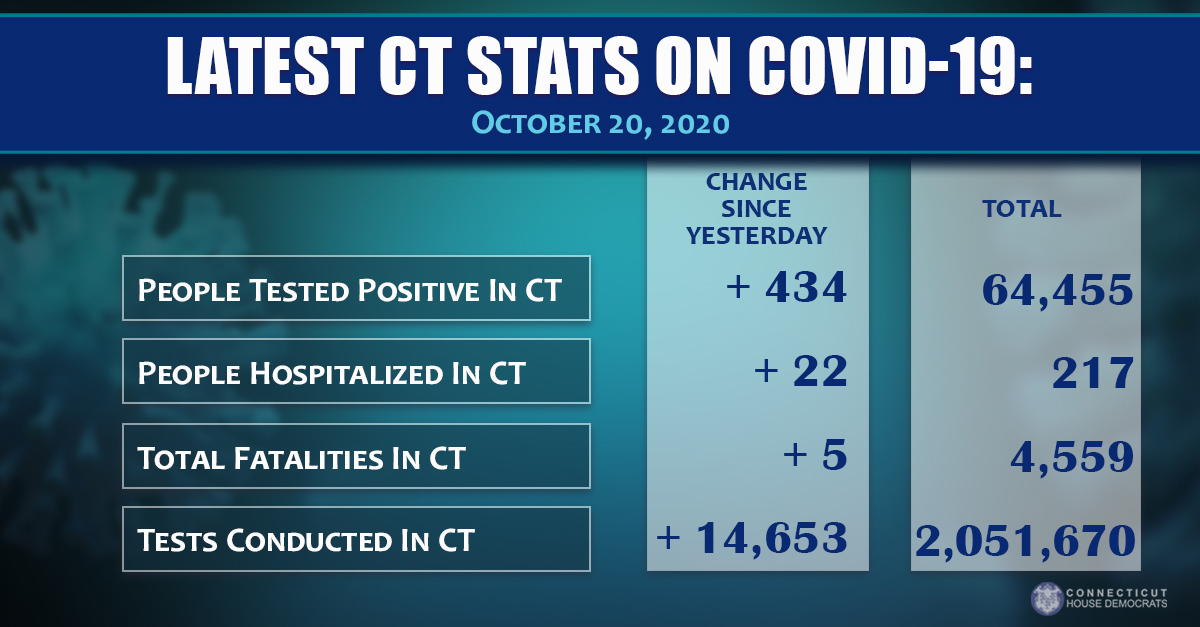CT Travel Advisory Updated
October 20, 2020As the State of Connecticut continues taking actions in response to the global spread of coronavirus disease (COVID-19), Governor Ned Lamont provided the following updates as of 7:00 p.m. on Tuesday, October 20, 2020:
Data updates on testing in Connecticut
The following is a summary of the day-to-day newly reported data on cases, deaths, and tests in Connecticut. It is important to note that these newly reported updates include data that occurred over the last several days to a week. All data in this report are preliminary, and data for previous dates will be updated as new reports are received and data errors are corrected.
For several additional graphs and tables containing more data, including a list of cases in every municipality, click here.
Governor Lamont signs 76th executive order to mitigate the spread of COVID-19
Governor Lamont today signed another executive order – the 76th since he enacted the emergency declarations – that builds upon his efforts to encourage mitigation strategies that slow down transmission of the virus. Executive Order No. 9H enacts the following provisions:
- Remote participation in agency and municipal meetings: Permits state agencies and municipal boards, commissions, councils, and local legislative bodies to conduct business using “hybrid meetings,” wherein members of the public may attend in-person and others attend and participate remotely using video technology, and allows members of such bodies to attend remotely. This order adds options for conducting municipal meetings, but does not repeal any previous executive orders on municipal meetings, such as Executive Order Nos. 7B and 7I.
- Technical revisions to extension of eviction moratorium: Makes technical revisions to Executive Order No. 9E, Section 1, which extended the moratorium on residential evictions through January 1, 2021.
|
**Download: Governor Lamont’s Executive Order No. 9H |
Weekly update to the regional travel advisory: Arizona and Maryland meet metrics to qualify, no areas removed
The regional travel advisory between Connecticut, New Jersey, and New York that directs incoming travelers from states with a significant community spread of COVID-19 to self-quarantine for a 14-day period was updated today: Arizona and Maryland have been added to the list of impacted locations that meet the metrics to qualify, and no states or territories were removed from the list this week.
The requirement to quarantine applies to any person traveling into Connecticut from a state with a positive case rate higher than 10 per 100,000 residents, or higher than a 10 percent test positivity rate over a 7-day rolling average. It also applies to any person arriving into Connecticut from a country for which the U.S. Centers for Disease Control and Prevention has issued a Level 3 Travel Health Notice.
Anyone arriving to Connecticut from any of the impacted locations is required to fill out a travel health form upon their arrival. The form can be filled out online at ct.gov/travelform.
The list of impacted locations is updated once per week every Tuesday. As of today, the full list of impacted locations under the travel advisory includes:
- Alabama
- Alaska
- Arizona
- Arkansas
- Colorado
- Delaware
- Florida
- Georgia
- Guam
- Idaho
- Illinois
- Indiana
- Iowa
- Kansas
- Kentucky
- Louisiana
- Maryland
- Michigan
- Minnesota
- Mississippi
- Missouri
- Montana
- Nebraska
- Nevada
- New Mexico
- North Carolina
- North Dakota
- Ohio
- Oklahoma
- Puerto Rico
- Rhode Island
- South Carolina
- South Dakota
- Tennessee
- Texas
- Utah
- Virginia
- West Virginia
- Wisconsin
- Wyoming
For the most up-to-date information on the regional travel advisory, including an extensive list of frequently asked questions, visit ct.gov/Coronavirus/travel.
Providing information to Connecticut residents
For the most up-to-date information from the State of Connecticut on COVID-19, residents are encouraged to visit ct.gov/coronavirus. Residents can also subscribe to text message alerts from the state by texting the keyword COVIDCT to 888-777.
Individuals who have general questions that are not answered on the website can call 2-1-1 for assistance. The hotline is available 24 hours a day and has multilingual assistance. Anyone who is out-of-state or requires a toll-free number can connect to Connecticut 2-1-1 by dialing 1-800-203-1234. This is intended to be used by individuals who are not experiencing symptoms but may have general questions related to COVID-19. Anyone who is experiencing symptoms are strongly urged to contact their medical provider.






